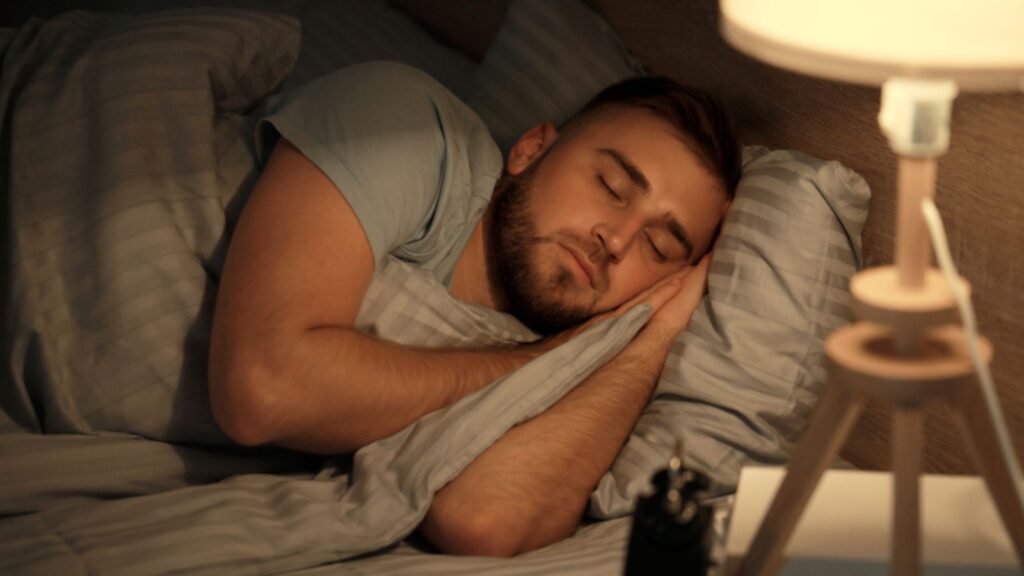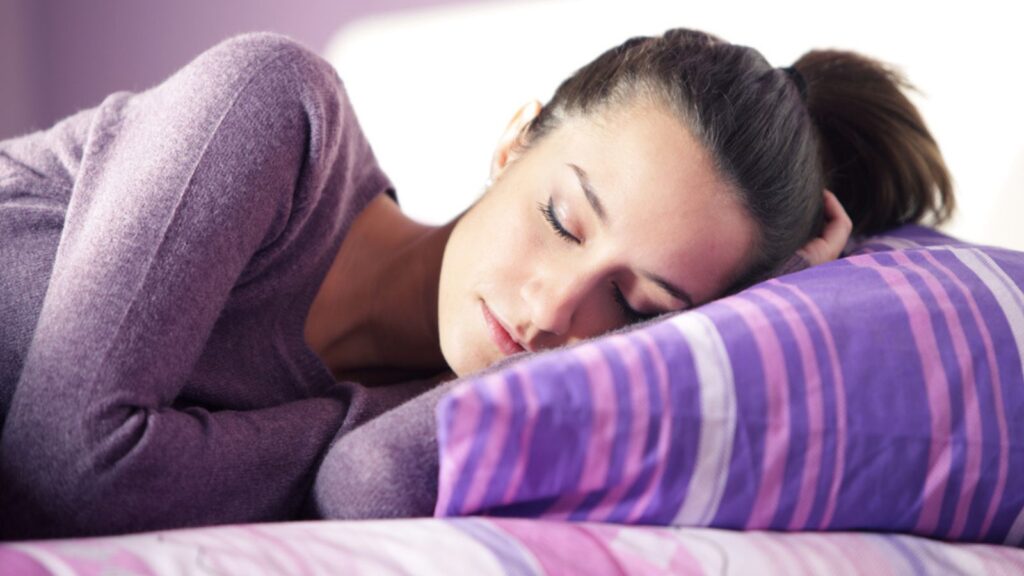Is 6 Hours of Sleep Enough? Here’s What Your Body Does on Different Amounts of Sleep
Sleep is a fascinating journey that opens the door to a healthier and more joyful version of yourself. However, the required amount of sleep varies from person to person. A common question arises: Is six hours of sleep sufficient to sustain us throughout the day? To unravel this question, let’s delve into the impacts on our bodies with varying durations of rest and strategies to enhance sleep hygiene.
1. Understanding the Sleep Cycle

Before delving into the impact of different hours of sleep, it’s essential to understand the intricacies of the sleep cycle. The sleep cycle consists of four stages: NREM (non-rapid eye movement) stages 1, 2, and 3, followed by REM sleep (Rapid eye movement).
Each sleep stage plays a unique role in ensuring a good night’s sleep.
2. Is 6 Hours of Sleep Enough? The Minimum

Six hours is the minimum recommended sleep duration for healthy adults. And while it might seem like a compromise you can live with, it’s worth considering the long-term consequences.
Sleep medicine experts say, “How much sleep you need is very individual, and everyone’s needs are a little different.”
If you find that you consistently get only six hours of sleep and are experiencing negative effects, it may be worth trying to adjust your sleep schedule to ensure you are getting closer to the recommended amount of sleep.
3. Side Effects of Only Six Hours of Sleep

Prolonged sleep deprivation leads to various health issues, including
- Impaired Cognitive Performance: Chronic sleep deprivation can impair memory, attention, and decision-making abilities
- Mood Changes: Individuals consistently getting only six hours of sleep are more prone to mood swings, irritability, and heightened stress levels.
- Weakened Immune System: With only six hours of sleep, the body’s defense mechanisms weaken, making it more susceptible to infections and illnesses.
- Increased Physical Health Conditions: (including obesity, heart disease, diabetes, and high blood pressure. )
- Fatigue and Low Energy: Six hours of sleep often results in a constant battle against fatigue and low energy levels.
- Weight Gain: Hormonal imbalances triggered by insufficient sleep lead to increased appetite and cravings for unhealthy foods. The cumulative sleep deprivation over time can contribute to unwanted weight gain and obesity.
4. Too Little Sleep: 4 Hours or Less

When you push the limits of sleep deprivation and get less than six hours or a mere 4 hours of shut-eye, your body and mind undergo severe stress and sleep debt.
It means every night, you’re not getting sufficient sleep your body needs, which creates a debt you owe to your overall well-being.
When you are sleep-deprived, your ability to think clearly is impaired, making tasks harder. It also makes you feel more stressed, anxious, and easily irritated. You will also experience poor mood and a weakened immune system, making you more likely to catch illnesses.
Trying to repay this sleep debt is crucial by getting sufficient and quality sleep whenever possible to keep your mind and body functioning well.
5. Just the Right Amount of Sleep: Seven to Nine Hours

How many hours should you sleep for better health? Seven to nine hours of sleep is the gold standard for adults are essential.
Getting more than six hours of sleep is associated with improved cognitive function. During the sleep cycle, the brain goes through various stages, including deep sleep and REM sleep, which play crucial roles in memory consolidation, learning, and overall cognitive performance.
Furthermore, maintaining a sleep duration of at least seven hours is closely linked to better mental health. This “sweet spot” in sleep duration has been shown to regulate mood and promote positive emotions. recommended seven to eight or nine hours, individuals may experience improved emotional well-being.
Consistently obtaining seven or more hours of sleep helps the immune system function optimally, providing better defense against illnesses and contributing to overall health and well-being.
6. Excessive Sleep (10 Hours or More)

Have you ever wondered if you can get too much of a good thing when it comes to sleep?
While a full night’s sleep is essential for overall health, sleeping consistently for 10 hours or more can adversely affect your health. Excessive sleep can disrupt natural circadian rythm , leading to difficulties in transitioning between sleep stages.
People who consistently sleep more than needed may experience symptoms such as grogginess, difficulty concentrating, and memory issues.
Consistently sleeping for extended periods may be associated with certain health risks. Some studies have linked excessive sleep to an increased risk of conditions such as obesity, diabetes, and cardiovascular issues. While poor sleep impacts mood, consistently oversleeping negatively can also have similar effects.
7. Too Much Sleep: (12 Hours or More)

Sleeping more than 12 hours per night is not normal for most adults. Firstly, it often leads to decreased productivity in daily activities.
Furthermore, spending excessive time in bed can contribute to social isolation. Some studies suggest a link between extended periods of sleep and certain health issues, including heart disease, diabetes, and obesity.
Mental health is not exempt, as a connection between prolonged oversleeping and conditions like depression has been observed. Addressing these concerns and finding a balance between better sleep quality and avoiding excessive sleep is crucial for maintaining overall health.
8. Varying Sleep Patterns

Inconsistent sleep patterns can wreak havoc on your body by disrupting its natural circadian rhythm.
The circadian rhythm is the internal clock that regulates the sleep-wake cycle, among other physiological processes. This internal clock is thrown off balance when your sleep schedule varies widely.
As a result, you may find it challenging to fall asleep consistently each night and wake up naturally in the morning. This disruption affects sleep health.
9. Inconsistent Sleep Patterns Impact on Physical Health

The consequences of inconsistent sleep patterns extend beyond difficulty in falling asleep. The irregularity in sleep can contribute to fatigue and grogginess during waking hours.
This fatigue impairs cognitive performance and can affect physical health and daily activities. Furthermore, inconsistent sleep may interfere with hormone regulation and metabolism, posing risks to overall health.
Hormones related to appetite, stress, and immune function can be adversely affected, causing obesity, increased stress levels, and a compromised immune system.
Establishing a regular sleep schedule is essential for maintaining the harmony of your body’s internal clock and promoting both physical and mental well-being.
10. The Weekend Sleep Binge

The idea of compensating for sleep deprivation during the week by sleeping extra on weekends is commonly known as “sleeping in” or “catching up on sleep.” While getting more sleep on weekends can offer some short-term relief and help reduce feelings of fatigue, it does not fully address the consequences of chronic sleep deprivation.
Here are a few reasons why relying on weekend sleep to compensate for a lack of sleep during the week may not be the most effective or healthy strategy:
- Circadian Rhythm Disruption
- Incomplete Recovery
- Social Jet Lag
11. Changing Sleep Needs Throughout Life

Sleep is not a one-size-fits-all concept; it varies based on age group and life stage. As we progress from infancy to adulthood, our sleep requirements undergo a transformative journey.
While babies necessitate a substantial amount of sleep in their initial year, this quota gradually diminishes until reaching adulthood.
12. Recommended Hours of Sleep by Age

- Infants (0-12 months): Newborns typically require the most sleep, ranging from 14 to 17 hours daily.
- Children (1-12 years): Toddlers and preschoolers generally need 10-14 hours of sleep per night.
- Teenagers (13-18 years): Adolescents often face challenges maintaining enough sleep due to school schedules, extracurricular activities, and social factors. However, they generally need 8-10 hours of sleep for optimal functioning.
- Adults (18-64 years): The general recommendation for adults is 7-9 hours of sleep per night.
- Older Adults (65 years and older): Older adults may change their sleep patterns. While some may still require 7-9 hours, others may find they are comfortable and alert with less sleep.
13. The Short Sleep Gene

Ever heard the term short sleepers? It is a unique group of individuals with a specific gene mutation. These fortunate few can thrive on fewer than six hours of sleep daily. Unlike those experiencing insomnia, natural short sleepers fall asleep faster; interestingly, they report a high quality of sleep.
This genetic variation gives them the ability to function on less sleep than the average person, showcasing the role of genetics in determining individual sleep needs.
14. Quality Over Quantity

While how much sleep you get at night is important, high-quality sleep also matters significantly. Both the Sleep quantity and quality play crucial roles in overall well-being. Enhance your sleep quality by:
- Prioritizing Sleep: Go to bed and wake up simultaneously every day, even on weekends.
- Setting up a Healthy Sleep Environment: Create a sleep-friendly space by keeping your bedroom cool, dark, and quiet. Invest in a comfortable mattress and pillows. Minimize noise and light disturbances to promote deep sleep.
- Practicing Good Sleep Hygiene Habits: Establish pre-sleep rituals to signal your body that it’s sleep time. This may include activities such as reading a book, taking a warm bath, or practicing relaxation techniques. Stop watching TV before bedtime, as the blue light emitted can interfere with melatonin production.
- Addressing Sleep Disorders: If you have trouble sleeping or suspect a sleep disorder, such as insomnia or sleep apnea, seek help. Consult with a healthcare provider or a sleep specialist to address any underlying sleep problems.
15. Is 6 Hours of Sleep Enough? Conclusion

In conclusion, while individual sleep needs can vary, while some people may feel well-rested with severn to eight hours of sleep, others may require slightly more or less. However, consistently getting only six hours of sleep may not be sufficient for optimal health.
If you have concerns about your sleep patterns or are experiencing negative effects due to inadequate sleep, it’s advisable to consult with a healthcare professional. They can provide personalized guidance and help identify any underlying issues that may be affecting your sleep. Prioritizing sleep is a fundamental aspect of maintaining optimal physical and mental health.
16 Tricks to Calming Your Nerves and Getting a Good Night of Rest (Finally)

Do racing thoughts disrupt your peaceful sleep? Your solution is at hand. Join an online community of members who have shared practical tips to help you quiet your mind and guarantee a peaceful night’s rest!
16 Tricks to Calming Your Nerves and Getting a Good Night of Rest (Finally)
10 Sleep Music Channels That Will Lull You to Sweet Dreams

Are you tired of countless sleepless nights, spent counting sheep or enviously watching others drift into slumber the instant their head touches the pillow? Whether you wrestle with insomnia, stress, or just desire a serene ambiance for a peaceful night’s rest, you’re in for a treat. In this exploration, we’ll dive into the top YouTube channels celebrated for their sleep-inducing music, tailored to address your sleep-related concerns. Join me as we reveal the finest YouTube channels crafted for the ultimate sleep experience.
10 Sleep Music Channels That Will Lull You to Sweet Dreams
14 Tips for Tackling Insomnia and Getting a Better Night of Rest

In this comprehensive guide, we will delve into established strategies that can greatly enhance your prospects of attaining the restful sleep your body craves.
14 Tips for Tackling Insomnia and Getting a Better Night of Rest
12 Ways to Ditch Constant Exhaustion and Finally Get Good a Good Night’s Rest

Across the world, a pervasive problem of sleep deprivation has firmly taken root. Our nights are often devoured by ceaseless tasks and distractions, causing us to rest our heads on our pillows at ungodly hours or, at times, not at all. Even when we do eventually find ourselves in bed, despite overwhelming exhaustion, sleep can remain elusive, ensnaring us in the cycle of feeling “tired and wired.” This battle is an experience universally acknowledged.
12 Ways to Ditch Constant Exhaustion and Finally Get Good a Good Night’s Rest
54 Perseverance Quotes to Help You Be Resilient and Crush Your Goals

Perseverance is a must-have character trait if you want to achieve your dreams and stay on track. Life is full of twists and turns, but with determination, resilience, and persistence, we can continue to strive for success.
54 Perseverance Quotes to Help You Be Resilient and Crush Your Goals







